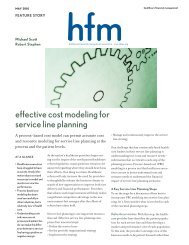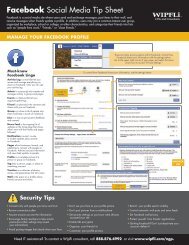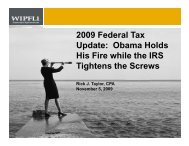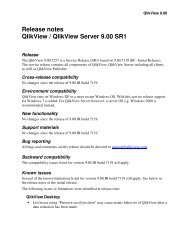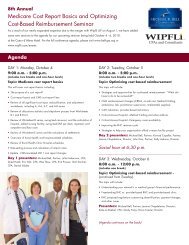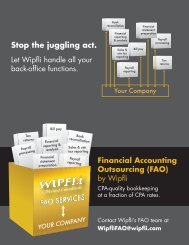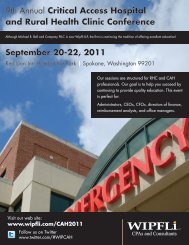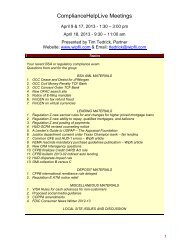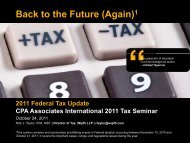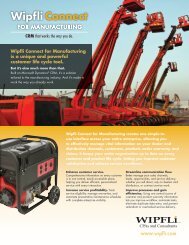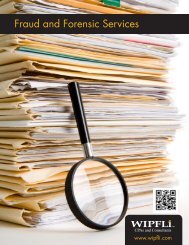Download PDF - Wipfli
Download PDF - Wipfli
Download PDF - Wipfli
You also want an ePaper? Increase the reach of your titles
YUMPU automatically turns print PDFs into web optimized ePapers that Google loves.
The Netherlands Update continued<br />
8 September 2011 the following amendments for the expat<br />
regime:<br />
transferred assets. The decision of the EU Court is<br />
expected in the spring of 2012.<br />
■<br />
■<br />
■<br />
■<br />
the criterion for “specific expertise” is only considered to<br />
be applicable if the employee obtains a minimum gross<br />
salary (€ 50.619 in 2011 if the employee is aged 30<br />
years or older and € 37.121 per year in 2011 if the<br />
employee is younger than 30 years)<br />
access to the expat regime for foreign PhD students<br />
who studied in Dutch universities and thereafter decide<br />
to start working in the Netherlands, taken into account<br />
that a lower minimum gross salary standard is applicable<br />
for them (2011: €26.605)<br />
the current reference period of 10 years is to be<br />
extended to 25 years<br />
employees who live within a radius of 150 kilometres<br />
from the Dutch border are excluded from access to the<br />
expat regime.<br />
Real Estate Transfer Tax<br />
Dutch Supreme Court upholds exemption from<br />
real estate transfer tax<br />
The Netherlands levy 6% Dutch real estate transfer tax<br />
(DRETT) upon the acquisition of (certain rights to) Dutch real<br />
estate. This equally applies when a company acquires at<br />
least one third of the shares in a Dutch real estate company.<br />
A company qualifies as a real estate company if the entity’s<br />
assets at the time of the acquisition and during the preceding<br />
year consist for 50% or more of real estate of which at least<br />
30% is Dutch real estate (asset test) which real estate is held<br />
mainly (70% or more) for acquisition, sale or exploitation<br />
(purpose test).<br />
International and EU<br />
Dutch exit taxation violates EU law<br />
Dutch tax law contains an exit charge in the event that a<br />
taxpayer ceases to be a Dutch tax resident. National Grid<br />
Indus Company (NGIC) challenged this exit charge. NGIC<br />
transferred its place of effective management to the United<br />
Kingdom. Under Dutch corporate law, NGIC does not lose<br />
its legal personality because the Netherlands apply the<br />
“incorporation principle” and not the “seat principle”.<br />
The assets of NGIC solely consist of receivables<br />
denominated in GB Pound with unrealised currency gains.<br />
The transfer of the effective management triggered -<br />
according to the Dutch tax authorities - taxation on the<br />
unrealised currency gains.<br />
The Appeals Court in Amsterdam presented the case to the<br />
EU Court and, on 8 September, the Advocate General of<br />
the European Court of Justice issued her opinion. According<br />
to the Advocate General, the Dutch exit taxation on<br />
companies that transfer their place of effective management<br />
to another EU Member State violates EU law. Regarding<br />
this matter, the Advocate General of the European Court of<br />
Justice argued that there is no justification, based on the<br />
freedom of establishment in the EU, to levy exit taxes<br />
without the possibility of postponing the payment and to<br />
take into account later losses on the hidden reserves of the<br />
The sale and purchase of Dutch real estate is exempt from<br />
Dutch Value Added Tax (VAT), except if (i) it is new real<br />
estate or (ii) it qualifies as a building premise. If the acquisition<br />
is subject to VAT, no DRETT is payable except if the (i) new<br />
real estate is used as a business asset and the purchase is<br />
within two years of taken into use and (ii) the purchaser is<br />
entitled to recover the VAT (in whole or in part).<br />
In a recent court case, the question was whether the DRETT<br />
exemption was also applicable if shares in a real estate<br />
company were purchased whose asset was a building<br />
premises; i.e the exemption would have been applicable if<br />
the building premises would have been purchased directly<br />
instead of the shares. On 10 June 2011, the Dutch<br />
Supreme Court ruled in favour of the taxpayer and decided<br />
that the DRETT exemption applies regardless of whether<br />
the real estate property was acquired directly or by the<br />
acquisition of shares in a Dutch real estate company.<br />
For more information please contact:<br />
Jan Roeland<br />
Partner<br />
PKF Wallast, the Netherlands<br />
T: +31 20 653 1812<br />
M: +31 6 20 414 629<br />
E: jrd@pkfwallast.nl<br />
30 // PKF International Tax Alert All Regions<br />
Issue 8 November 2011




